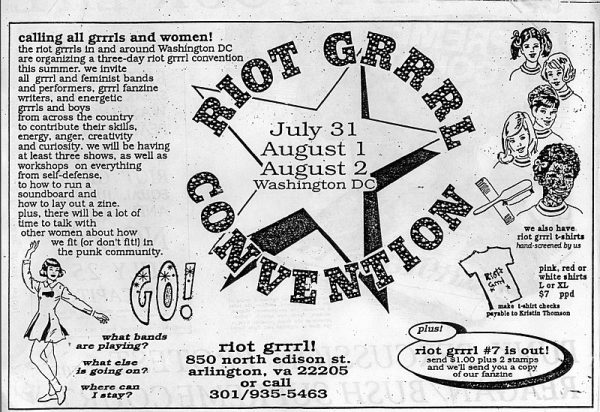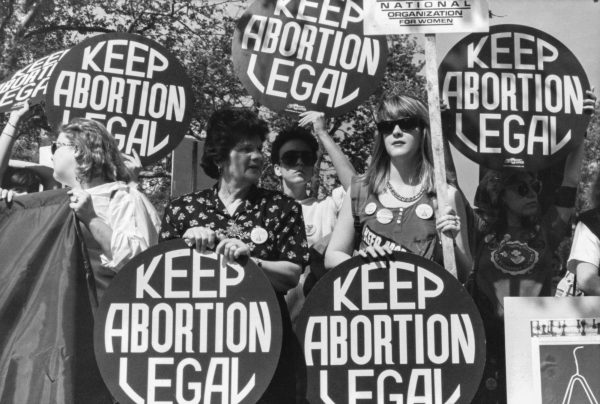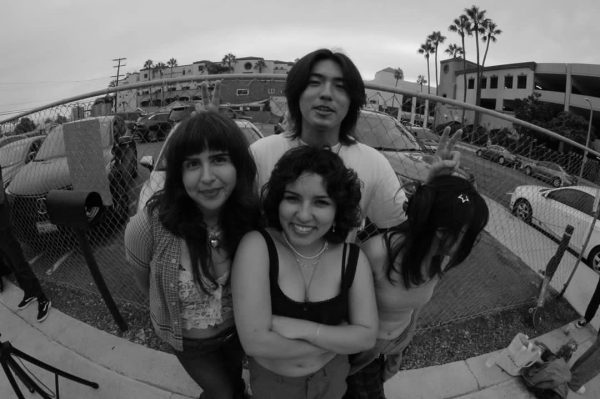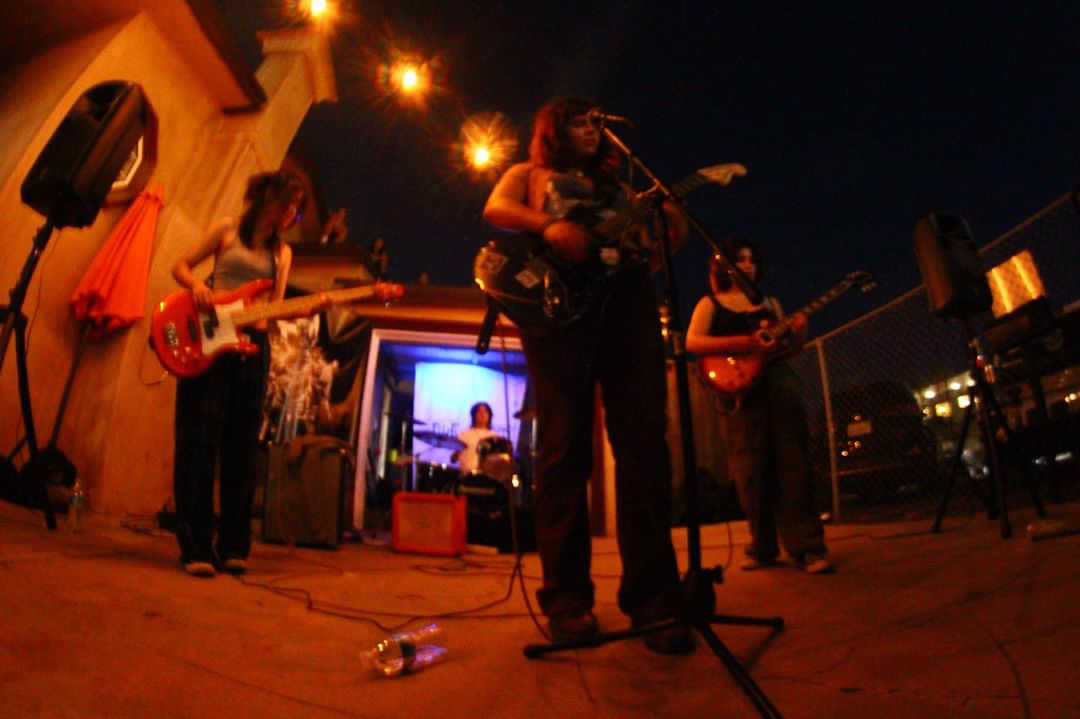For many people, the 90s era meant contemporary hip hop and pop music and colorful fashion for everyone. For women, however, there was a new revolution that grew notorious instead.
Known commonly as the “Riot Grrrl Revolution,” young women originally in Olympia, Washington were brought together by punk rock with a common goal of promoting feminist ideals and sharing stories. Their initial hopes were for women to support other women through music, and they proceeded to grow into an underground movement with political involvement.
The movement marked the first official time that women were introduced into the punk scene and taken seriously by a large following of feminists and the press. Stacy Long, a public relations professor at Cal. State University, Northridge and Music Publicity Specialist, can distinctly remember how important the movement was to her in the 90s.
“I think we didn’t really have a voice, there was pop music, some light rock music and there were a few spattering of rock bands, but this was literally revolutionary for women to say ‘I’m not here for the male gaze,” Long said. “I’m here because this music is amazing, I’m here because I have something to say.”
Long remembers various aspects of being a part of the Riot Grrrl following, such as the “fanzines,” or “zines”, as they were more lovingly called by listeners. Zines were homemade magazines created by fans of a particular Riot Grrrl band that advertised each band, members, music and lyrics. These zines grew from band details to information regarding particular movements or feminist stories.
Zines also helped identify band names such as “Bikini Kill” and gave the revolution its identity.

“It takes back the word girl,” Long said. “We talk a lot about taking back words, but in this case, ‘girl’ was so fragile. But Grrrl, when you put that growl in it, it’s a way of saying that we’re not playing around. Again, that was a community-adapted term. Nobody gave them that term, nobody called them that, they created that moment which was genius.”
Various “revolutionary” aspects contributed to widespread collaboration. Paige Maruca, a junior at Sage Creek High School and punk enthusiast, finds interest in the bravery and expression of women who took part in the revolution.
“They could be women and still be punk,” Maruca said. “Girlier clothes could still be tough. Kathleen Hannah from ‘Bikini Kill’ used to perform in a thong, it doesn’t get much girlier than that.”
A total expression through lyrics which often detailed stories of assault or frustration, and fashion being completely limitless, was what drew many people into the cause.
Meadow Chiu, bass player for the band “Five Point” in Carlsbad and student at SCHS, finds expression through lyrics to be particularly influential. Due to her band being female-fronted, lyrics written by a woman have distinct meaning to her.
“Women can write about a lot of different topics and convey that through music that might not be topics touched upon by men. I think that can appeal to a large variety of people out there,” Chiu said.
The things that made people stay, however, were the movements that took place.
“We did things like marches on Washington and women’s marches,” Long said. “I think widespread change takes everybody. I don’t think you can have change without widespread inclusivity and having everybody sign on.”
The March on Washington that Long recalled was a protest held by various Riot Grrrl bands and feminists in April 1992. The protest was “one of the largest protest marches on the nation’s capital, the pro-choice rally came as the U.S. Supreme Court was about to consider the constitutionality of a Pennsylvania state law that limited access to abortions.”
Because of this protest and the reaction it gained from citizens, the decision was overwritten, and soon after in January 1993, President Bill Clinton overturned several major anti-abortion legislative bills.

Now, Tobi Vail, member of the band “Bikini Kill” and creator of the name “Riot Grrrl” and “Jigsaw Zine,” has been an open advocate for the ceasefire in Palestine on her blog.
She recently wrote on “Jigsaw”, “As an intersectional feminist, I support the struggle for Palestinian liberation. As backed by the United Nations, Amnesty International, and numerous Jewish organizations, we need to demand a cease-fire immediately and allow the borders to open so that medical supplies, aid, food and water can reach civilians caught in a war zone. Please contact your representatives and government today asking them to back this.”
Although a majority of women were in favor of the movement as a whole, there continued to be those who disagreed with the movement.
“Some people were really on board with the Riot Grrrl movement, but some people hated it. And it was specifically because girls were girls,“ Maruca said. “They were young, they were judged for writing angrily, how the industry sucked and about sexism. People didn’t take that aspect seriously, but it’s a serious topic and I don’t think age should limit people to talk about it.”
College and high school students were the main advocates for the revolution which in turn meant exclusion from the media, hatred from the press and overall a lesser respect for their opinions. All because of their sex and age.
In Long’s opinion, the press’ distaste for women led to the public “fizzling out” of Riot Grrrl in the 2000s. “The real answer is the music business does not like women. It just doesn’t.”
She continued to note how recently, “Rolling Stones” editor Jann Wenner wrote a book about the most influential artists in rock history. In a particular interview when Wenner was questioned as to why his book only included seven interviews with white men, Wenner responded by saying, “No female musicians were “as articulate enough on this intellectual level” as the men.”
“They didn’t want to go public, they wanted to be an underground community and create change from within. So by saying they didn’t want attention publicly, they got ignored almost completely.” Long said.
Even though it was a women-led movement, there was continued criticism about non-inclusivity. Men addressed the “Reverse sexism” that was occurring along with limited race inclusion and people with disabilities.
Chiu noted about her band particularly that there continue to be male-based bands, but the special thing about the movement was the women’s popularity.
“There are women outside of our band making music, but it’s never the majority of the band. There’s a lot of male-white bands out there, and they make great music, but we’re always the minority.” Chiu said.

The Riot Grrrl revolution was said to fizzle out in the early 2000s with the progression of pop and hip hop. However, the meaning of the movement continues today – underground through zines and those who are passionate about it.
“Without allies, advocates and without someone standing next to you, you feel powerless. But when somebody stands next to you and helps, it changes everything. One person is not as powerful as two or 50 even. We have so much access to media, so if we’re not using it for good, what are we using it for?” Long asked.
Media today gives people the ability to hold ideas and opinions while gathering widespread change and support for important topics. Media, if used correctly, has the power and strength to change everything.
Media can include written pieces, apps, photography, videography and zines. Jigsaw’s Guide to the Feminist Theory includes excerpts by women all over the world who have experienced rape, inequality and threats from various outsiders. It gives others the ability to support them and maintain community.
Long noted that music is a fantastic way to cultivate change.
“If everyone’s in the band, who’s in the audience?” Long said. “If everyone is in a band, who is doing all the other stuff? It’s super important to be supportive of a band, supportive of a message, and to continue to support.”
Confidence doesn’t mean fearlessness. The confidence to start a movement and to say something isn’t easy, especially when it’s done with only one voice. The stage and voice to say something whether through media or music, can be the best starting point for anyone.
“If I have the confidence to stand up for something, even if I haven’t experienced it, I’m going to do it. [Bands] can get on a stage and sing about it, and people there will listen to that power they have,” Maruca said.
The name ‘Riot Grrrl’ is traditionally pronounced “riot girl,” but the written meaning is much deeper than simply an angry girl. The growl of the three rs creates a vision of an unruly, rowdy and wild girl who has the intention of making an impact–a snarl echoed throughout millions of women originating in Washington but reaching the rest of the world in a matter of years. Riot Grrrl belongs to the influential women of the 90s, but today the meaning reaches everyone – audience and band members alike.










Jacob Dougherty ◊ Dec 11, 2023 at 9:40 am
Was this on your Spotify wrapped?